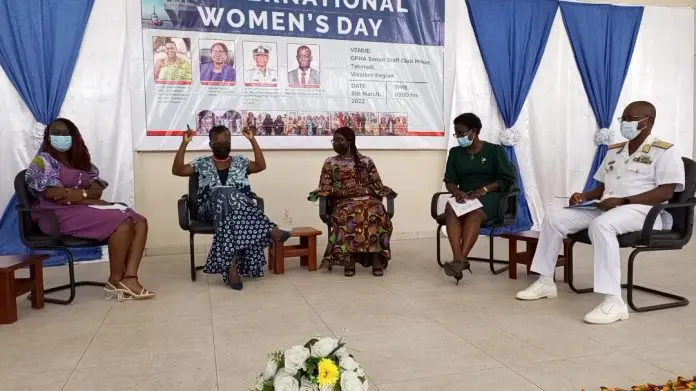WISTA-Ghana marks Int’l Women’s Day in T’di
“Having women in positions is crucial but it will not come at the expense of education and training. Women, I encourage you that you have to take your place at the table. Do not expect the red carpet to be rolled out for you just because you are a woman. You have to position yourself and when the opportunity comes you take your place.”
- Advertisement -
Director of Port of Tema Sandra Opoku has admonished women not to expect favours in their quest to reach higher career heights simply because of their gender.
Rather, she encouraged women to equip and prepare themselves adequately to place them in pole position so as to be the unassailable preference whenever there is a vacancy.
- Advertisement -
“Having women in positions is crucial but it will not come at the expense of education and training. Women, I encourage you that you have to take your place at the table. Do not expect the red carpet to be rolled out for you just because you are a woman. You have to position yourself and when the opportunity comes you take your place.”
- Advertisement -
She encouraged women especially in the maritime and shipping industry to take part in the IMO SheEO leadership programme, which focuses on equipping women with leadership skills “and confidence to take a seat at the maritime and shipping table”.
Mrs. Opoku was speaking at the Celebration of the International Women’s Day organised by Women in International Shipping and Trading Association, (WISTA) for women and girls group within the Western Region.
The programme, themed ‘Gender Equality Today for a Sustainable Tomorrow within the Maritime Industry’, was also to drum home the continuous efforts needed to empower women in the Maritime and Shipping industry.
In the maritime industry, women represent only 1.2 percent of the global seafarer’s workforce as per the BIMCO/ICS 2021 Seafarer Workforce Report.
Again, the World Ports Sustainability Report for 2020 puts gender equality almost at the bottom of port priorities in their projects.
Mrs. Opoku explained that the long interaction of men and the sea has created significant cultural barriers to the participation of women in seafaring.
“This is, however, no excuse for the continued exclusion of women, or failing to support the many women who have pushed past outdated gender norms and made great strides in improving the participation of women in maritime.”
- Advertisement -
According to her, “it is time to change social perceptions indicating that jobs in the maritime industry require skills more associated with men and also work on some of the prejudices women face in employment within the maritime industry even though they have the requisite skills”.
The Women in International Shipping and Trading Association (WISTA) is a network of professional women in the maritime industry formed to promote their interest and career development.
President of WISTA-Ghana Jemilat Jawulaa Mahamah stated that in order to harness gender equity in the country’s maritime industry, women must be allowed to play active roles at all levels.
“A looming problem will be how the role and contributions of women in maritime development is recognized and framed. If women are to be fully included in the maritime industry then discussions cannot be limited to participation in one or two areas such as environmental work or entrepreneurship such as ship ownership.”

Jemilat Jawulaa Mahamah is encouraged by the rise in the number of women receiving education and training in marine piloting but indicated that the numbers are only part and not the full story of the extent to which women participate in the sector.
“Women who go to sea must gain multi-level and multi sector experience such as executive or engineering positions rather than being limited low economic budget.
“As we celebrate today, it is my hope that there will be renewed commitments and efforts to ensure that the role of the woman in the maritime industry is given prominence.
Source:|Connect FM|3news.com|Ghana
- Advertisement -



